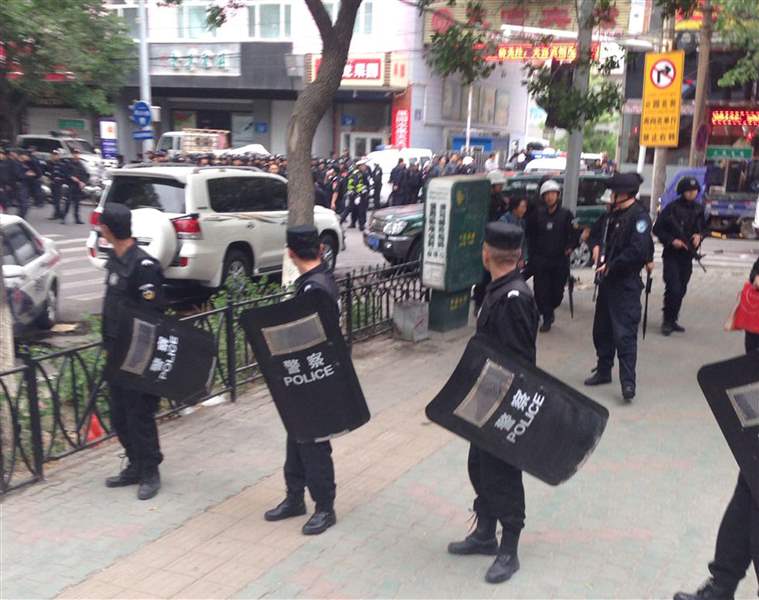
Explosives used in attack in China's Xinjiang
5/22/2014
In this photo released by China's Xinhua News Agency, police officers stand guard near a blast site which has been cordoned off, in downtown Urumqi, capital of northwest China's Xinjiang Uygur Autonomous Region, Thursday, May 22, 2014. Attackers crashed a pair of vehicles and tossed explosives in an attack Thursday near an open air market in the capital of China's volatile northwestern region of Xinjiang, leaving an unknown number of people dead and injured, state media reported. (AP Photo/Cao Zhiheng)
ASSOCIATED PRESS
BEIJING (AP) — Attackers crashed a pair of vehicles and tossed explosives in an attack today near an open air market in the capital of China’s volatile northwestern region of Xinjiang, leaving an unknown number of people dead and injured, state media reported.
The official Xinhua News Agency said several people were rushed to hospital and flames and heavy smoke were seen at the scene, which was cordoned off.
Xinhua said the assailants plowed through crowds of shoppers in off-road vehicles and threw explosives out the window before crashing head-on in the early morning attack in the city of Urumqi. It said one of the vehicles then exploded and quoted an eyewitness as saying there had been up to a dozen blasts in all.
A statement from the Xinjiang regional government said the attack occurred at 7:50 a.m. and people had been killed and injured, but gave no further details.
“I heard four or five explosions. I was very scared. I saw three or four people lying on the ground,” said Fang Shaoying, the owner of a small supermarket located near the scene of the blast.
Photos from the scene posted to popular Chinese social media site Weibo showed at least three people lying in a street with a large fire in the distance giving off huge plumes of smoke. Others were sitting in the roadway in shock, with vegetables, boxes and stools strewn around them. Police in helmets and body armor were seen manning road blocks as police cars, ambulances and fire trucks arrived on the scene.
Urumqi was the scene of a railway station bomb attack late last month that killed three people, including two attackers, and injured 79. Security in the city has been significantly tightened since the attack, which took place as Chinese leader Xi Jinping was concluding a visit to the region.
The city saw ethnic riots that killed nearly 200 people in 2009, but had been relatively quiet since then amid a smothering police presence.
The station attack and other violence have been blamed on radicals from among the region’s native Turkic Uighur Muslim population seeking to overthrow Chinese rule in the region.
Information about events in the area about 2,500 kilometers (1,550 miles) west of Beijing is tightly controlled.
Tensions between Chinese and ethnic Uighurs (pronounced WEE‘-gurs) in Xinjiang have been simmering for years, but recent attacks — while still relatively crude — show an audaciousness and deliberateness that wasn’t present before. They are also increasingly going after civilians, rather than the police and government targets of past years.
In an unprecedented incident last year, three Uighurs rammed a vehicle into crowds in a suicide attack near the Forbidden City gate in the heart of Beijing, killing themselves and two tourists.
And in March, 29 people were slashed and stabbed to death at a train station in the southern city of Yunnan blamed on Uighur extremists bent on waging jihad.
Uighur activists say the violence is being fueled by restrictive and discriminatory policies and practices directed at Uighurs and a sense that the benefits of economic growth have largely accrued to Chinese migrants while excluding Uighurs. The knowledge that Muslims elsewhere are rising up against their governments also seems to be contributing to the increased militancy.
Today’s attack came two days after courts in Xinjiang sentenced 39 people to prison after being convicted of crimes including organizing and leading terrorist groups, inciting ethnic hatred, ethnic discrimination and the illegal manufacturing of guns.
Among those convicted Tuesday was 25-year-old Maimaitiniyazi Aini, who received five years in prison for inciting ethnic hatred and ethnic discrimination for comments he made in six chat groups involving 1,310 people, the Supreme Court said.
In another case, a Uighur man was jailed for 15 years after he preached jihad, or holy war, to his son and another young man, according to the court.